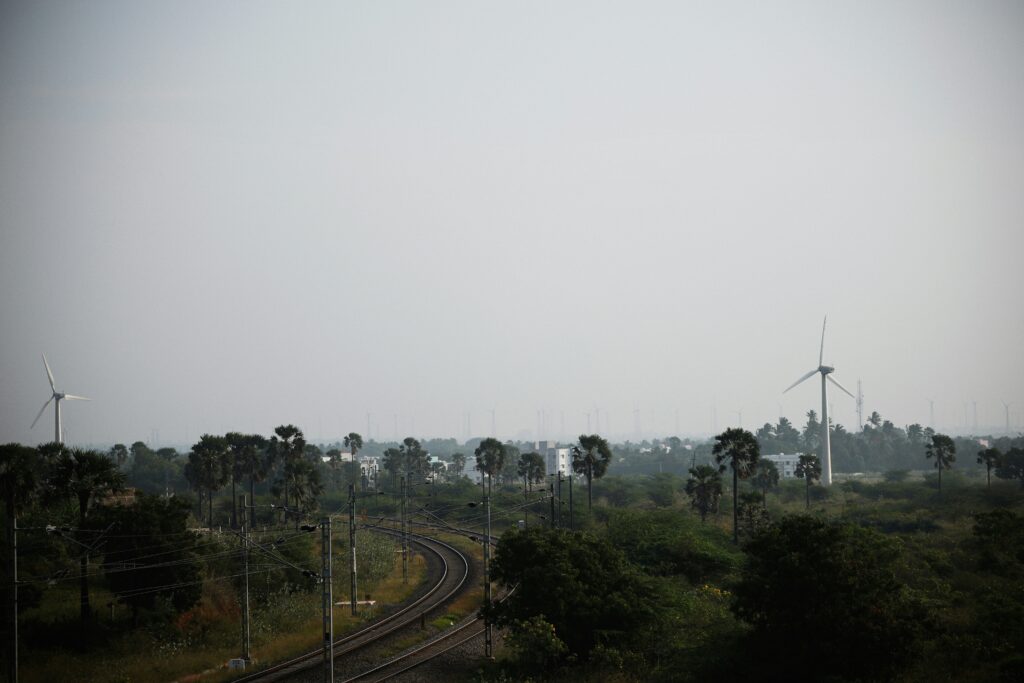The Startups Leading India’s Climate-Tech Transformation
From Coimbatore to Pune, a new generation of startups is driving India’s decentralised decarbonisation journey.
Turning heads across Indian fields today is the Takavator. With its tangle of exposed pipes, metal funnels, and conveyor belts atop a green trailer, it looks straight out of a mad scientist’s lab. But behind its appearance lies a game-changing solution to one of India’s most urgent challenges – air pollution caused by stubble burning.

Every autumn, millions of farmers burn their leftover crop residue, releasing a thick blanket of smoke that chokes cities and towns across the country, leading to health problems and respiratory illnesses. Reuters reported in 2023 that stubble burning in the neighbouring states of Punjab and Haryana caused almost 40% of the air pollution in New Delhi, a city that has ranked as the most polluted in the world on the Air Quality Life Index (AQLI) for eight years running.
Tackling this air pollution crisis is Takachar, a Mumbai-based startup and the brain behind Takavator. The team uses circular economy innovation to transform crop residue – materials that would otherwise be burned – into high-value products.
The machinery is cheap, portable, and affordable. It processes crop residues like rice husks into biochar-based soil fertiliser, which can be applied directly to fields improving soil health. Additional products include biofuels and chemicals. By turning agricultural waste into useful commodities, Takachar not only mitigates pollution but also promotes sustainable resource use – closing the loop in the agricultural cycle and driving innovation for a low-carbon economy.
From workshops in Coimbatore to laboratories in Pune, and accelerators nurturing climate-tech startups nationwide, thousands of entrepreneurs are building technologies that could define India’s low-carbon future.
Takachar is part of a rising wave of climate-tech startups tackling India’s most pressing challenges – air pollution, climate emissions, water scarcity, and food insecurity – shaping the country’s sustainable future.
From workshops in Coimbatore to laboratories in Pune, and accelerators nurturing climate-tech startups nationwide, thousands of entrepreneurs are building technologies that could define India’s low-carbon future. Small in size, but transformational in ambition, these startups are driving a transformative shift toward a greener, more resilient India.
India’s climate-tech scene now comprises of about 3,000 startups, according to an article published in 2025 by Latitude Media, from registered ventures to actively funded players. IIMA Ventures, an investment firm for innovation in India, reports that between 2014-2024 the climate tech startup ecosystem raised over $3.6 billion USD. India’s decarbonisation market alone is projected to be worth $10.3 billion USD by 2032.

This isn’t just about business success but about building the infrastructure for national transformation. Startups serve as crucial bridges between laboratory innovations and market-ready solutions, turning breakthrough technologies into affordable, scalable tools for decarbonisation. They’re also employment engines: young companies, not just big ones, generate the fastest job growth in India – essential in a country where millions enter the workforce annually. Perhaps most importantly, they create positive spillovers that benefit society far beyond their immediate commercial impact.
Since 2016, Climate Collective Foundation has worked to strengthen this ecosystem – helping climate tech entrepreneurs navigate the journey from idea to scale, bridging the crucial stages in a startup’s journey, known as the “valleys of death”. To do this, we have developed an ecosystem model comprising accelerator programs (capacity building, mentorship, investor connects, and market access); piloting & deployment platforms for industrial-decarbonisation; access to risk capital (grants and syndicated equity); convenings and networking events to bring the ecosystem together; and a vibrant community (of over 25,000 committed stakeholders). All this stems from our conviction that ecosystem-building to support climate-tech startups is urgent and essential for India’s decarbonisation journey, and equally, ecosystem orchestration assumes greater significance as the market matures.
Current transformative trends
India’s climate-tech landscape is experiencing transformative trends reshaping how the country approaches its climate challenges. From government-led initiatives to region-specific innovations and groundbreaking sectoral advancements, these trends are not only accelerating India’s transition to a low-carbon future but also positioning the nation as a global leader in sustainable solutions.
Here are the key patterns we’ve observed shaping the future of India’s climate-tech ecosystem:
1. Government as catalyst for climate innovation
India’s policy framework has evolved from broad startup promotion to targeted climate-tech acceleration. The Indian Government’s Production-Linked Incentive (PLI) schemes exemplify this shift – attracting ₹45,000 crore in battery manufacturing investments and enabling startups like Ola Electric to scale battery manufacturing and electric vehicle (EV) production.

The National Electric Mobility Mission and the Faster Adoption and Manufacturing of Electric Vehicles in India (FAME) schemes have catalysed an entire ecosystem, while the upcoming deep-tech policy promises dedicated funding for research and development pilots in carbon capture, green hydrogen, and bio-based materials. This integrated approach, where industrial policy, energy transition, and climate goals reinforce one another, has become one of the most powerful enablers of startup growth.
2. Decentralising innovation beyond metros
A striking development in India’s startup scene is geographic decentralisation. The Economic Survey of India 2023–24 found that nearly half of all Indian startups now originate from Tier-2 and Tier-3 cities – rapidly growing hubs such as Pune, Jaipur, and Coimbatore. An analysis published by CoreStory India in 2025 indicates that more than 50% of all startups are now based outside major metros, such as Delhi, Mumbai, and Kolkata. The trend is driven by lower costs, a growing pool of talent, and improved digital infrastructure. While these figures are not specific to any particular sector, it’s reasonable to infer that the climate-tech ecosystem also follows this pattern, as innovation follows regional needs and opportunity. This decentralisation not only spreads entrepreneurial activity but also drives locally-rooted solutions addressing region-specific challenges.
Consider Tan90, a Coimbatore-based startup that developed IoT-enabled water management systems specifically for Tamil Nadu’s textile clusters, where water scarcity directly threatens industrial operations. Their solution, now scaling across similar industrial belts in Karnataka and Andhra Pradesh, demonstrates how distributed innovation creates spatially equitable decarbonisation – ensuring India’s climate transition remains inclusive rather than metro-centric.
3. Sectoral breakthroughs driving change
India’s climate-tech landscape now spans seven critical domains, each with solutions that are rapidly maturing and scaling. Industrial decarbonisation is one of the most pressing areas, with startups such as LivNSense deploying AI-driven digital twin platforms that allow factories to monitor operations, optimise processes, and cut emissions in real time across hard-to-abate sectors, such as energy-intensive industrieslike steel and cement, where decarbonisation is particularly challenging.
In the energy transition space, the challenge lies in ensuring grid reliability as renewable supply grows. Companies like TekUncorked are stepping in with Internet of Things (IoT)) sensors and advanced analytics that help utilities detect faults early and integrate clean energy more reliably, reducing energy transmission losses by up to 15%. Mobility solutions are another area of transformation. Startups such as Kazam are building affordable EV charging networks across metros and Tier-2 cities, while Ather Energy has demonstrated that Indian consumers are willing to embrace electric vehicles when infrastructure and economics align.
Circular economy innovations are helping reduce both waste and dependence on fossil fuels. Econscious has pioneered biodegradable, bio-based packaging to replace single-use plastics at scale, while Banyan Nation operates India’s largest plastic recycling platform, processing an impressive 30,000 tonnes annually. In parallel, carbon removal technologies are emerging as a vital complement to emissions reduction. String Bio, for example, converts methane emissions into sustainable proteins and chemicals, turning greenhouse gases into valuable products and new revenue streams for industries.
Circular economy innovations are helping reduce both waste and dependence on fossil fuels.
Protecting and restoring natural systems is another frontier. Recognising that ecosystem health underpins climate resilience, startups like NatureDots are applying deep-tech platforms for the restoration of rivers and lakes, reviving biodiversity while also supporting local livelihoods through sustainable ecosystem management. Finally, adaptation and resilience solutions are helping communities and businesses cope with intensifying climate risks. Fasal’s AI-powered precision agriculture enables farmers to reduce crop risk, conserve water, and build resilience against extreme weather events, allowing them to adapt proactively rather than reactively.
Together, these innovations form a deepening pipeline that connects directly to India’s most urgent emission and resilience challenges, while positioning Indian entrepreneurs at the global frontier of climate technology.
A two-way innovation street
This climate-tech innovation story transcends borders. Indian entrepreneurs bring resourcefulness, market agility, and global ambitions, starting with local affordability constraints then adapting solutions for international markets. The Chennai-based Zerowatt Energy’s AI-powered industrial energy optimisation platform is expanding to the United Kingdom, bringing Indian energy intelligence solutions to European manufacturing sectors seeking decarbonisation. While Takachar’s solution to the stubble burning crisis is now being deployed across Kenya, Uganda, and other developing economies facing similar agricultural waste challenges. They even won the ‘Clean Our Air’ category in the Earthshot Prize, a prestigious global awards program launched by Prince William to fund innovative solutions to the world’s most urgent environmental challenges

But the learning flows both ways. Europe brings a decade of experience in financing deep-tech ventures, operating blended climate funds, and enforcing industrial decarbonisation standards. The European Innovation Council’s climate-tech accelerators and Germany’s carbon border adjustment mechanisms offer valuable models for Indian policymakers.
Europe’s regional diversity mirrors India’s geographically dispersed innovation landscape, making Indian approaches to distributed scaling especially relevant. Joint accelerators, such as the Indo-German Energy Programme’s startup initiatives, highlight how bilateral collaboration can amplify impact.
Building the decarbonisation engine
The path forward is complex but increasingly navigable, with systemic barriers that need targeted intervention. Overcoming these challenges requires coordinated efforts across government, industry, and finance to create an environment conducive to innovation and scale. To fully unleash the country’s climate-tech startup movement, India must pursue five strategic priorities:
- Establish dedicated growth-stage climate funds with 10-year investment horizons and blended finance structures that can bridge the critical stage between pilot and scale.
- Strengthen incubation infrastructure beyond metros, ensuring Tier-2 and Tier-3 cities have access to world-class validation facilities, technical expertise, and mentorship networks.
- Anchor demand systematically through corporate and public procurement programs that guarantee early market access for breakthrough solutions, following models like Denmark’s green procurement requirements.
- Harmonise policy frameworks between central schemes and state programs, creating seamless pathways from ideation through commercialisation without regulatory friction.
- Deepen India-EU partnerships through joint funding mechanisms, shared accelerator programs, and mutual market access agreements that enable startups to scale across both regions simultaneously.
From startup ideation to a decarbonised future
India’s climate-tech startups are the building blocks of a decarbonised future – where Delhi’s children breathe cleaner air, Mumbai’s streets better withstand monsoon floods, and farmers across Rajasthan use AI-powered tools to adapt to water.
With more than 800 active ventures, billions in funding, and globally minded entrepreneurs, India is not just catching up but has a unique, generational opportunity to lead the world’s climate transition. These startups are designing tomorrow’s solutions today – not only for India’s air, water, and energy crises, but for planetary sustainability. Supporting them is more than an economic policy, it’s a commitment to a ensuring a liveable, resilient future for generations to come.
